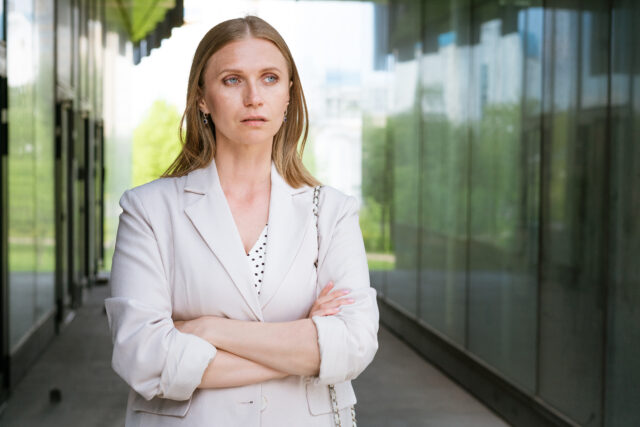We all mess up, but not everyone can (or will) say “I’m sorry.”

When someone avoids apologising, especially when they’re very clearly in the wrong, it reveals more than just stubbornness. It often points to deeper fears, habits, and emotional blind spots that they might not even be aware they have. Here’s what’s really behind their inability—or refusal—to say they’re sorry.
1. Apologising feels like admitting they’re a bad person.

Some people link mistakes to their identity. If they say they’re sorry, it feels like they’re admitting they’re flawed or unloveable, not just wrong in a moment. For them, apologising isn’t about the situation; it’s about protecting their self-worth.
This can be frustrating when you’re just looking for accountability, not self-flagellation. However, understanding that their defensiveness often masks deeper insecurity helps you stop expecting something they may not know how to give yet.
2. They’ve learned to survive by avoiding blame.

If someone grew up in a home where blame came with punishment, shame, or rejection, they may have learned early on that apologising is dangerous. Their instinct is to deflect instead of own up.
They’re not always purposely being manipulative; it’s often a protective reflex. Nevertheless, after a while, that defence mechanism strains relationships. If they can’t acknowledge fault, you’re left carrying the emotional weight of their actions while they stay guarded.
3. They believe intentions matter more than impact.

“I didn’t mean to hurt you” often becomes their go-to line, and while intentions do matter, they’re not a substitute for accountability. Someone can have good intentions and still cause harm.
If they’re stuck in this mindset, they might genuinely not understand why you’re upset. To them, meaning well should be enough. However, if they’re unwilling to consider the actual impact of their behaviour, healing the hurt becomes nearly impossible.
4. Their ego is louder than their empathy.

Some people simply can’t handle the idea of being wrong. It bruises their ego in a way that feels unbearable. So rather than admit fault, they double down, shift blame, or change the subject entirely.
That lack of empathy in the moment can feel cold or even cruel. It’s not that they don’t care deep down; it’s that their need to protect their pride overshadows everything else. In the long run, that need destroys connection.
5. They see vulnerability as weakness.

Apologising takes vulnerability. It means opening yourself up to someone else’s disappointment or pain, and not everyone is comfortable in that space. For some, saying sorry feels like losing power or control.
That mindset often leads to emotionally distant dynamics. If they avoid vulnerability at all costs, they’ll also avoid the conversations that build deeper trust, and you’re left doing the emotional labour they won’t touch.
6. They don’t actually see what they did wrong.

Some people genuinely don’t believe they’ve done anything worth apologising for. Their worldview might not include your emotional experience, especially if it challenges their self-image or disrupts their narrative of being “the good one.”
When they’re unwilling to reflect, it can feel like gaslighting, even if that’s not their intent. You end up questioning your reality while they move on like nothing happened. That’s not just frustrating; it’s damaging over time.
7. They think apologies open the door to more criticism.

Apologising can feel like opening the floodgates. Some people worry that once they admit to one thing, they’ll be hit with a long list of everything else they’ve ever done wrong. So instead, they shut down or avoid it entirely.
That fear-based reaction stops any kind of resolution. When someone sees apologies as threats rather than healing tools, even small misunderstandings turn into long-term rifts. It becomes impossible to move forward without basic accountability.
8. They were never taught how to do it.

It sounds simple, but not everyone grows up learning how to say, “I’m sorry” well. Some households didn’t model apologies at all, or worse, used them manipulatively. So as adults, they’re left unsure how to navigate those conversations.
That doesn’t excuse bad behaviour, but it does help explain it. If apologies were never shown as part of a healthy relationship, it’s no wonder some people shut down or avoid them completely when conflict arises.
9. They don’t want to give you that “win.”

In power-struggles, some people treat apologies like surrendering. They worry that saying sorry puts you “above” them or gives you leverage. So instead of acknowledging hurt, they dig their heels in deeper.
That kind of dynamic turns every disagreement into a tug-of-war. It’s less about resolution and more about control. When someone sees relationships as competitions, apologies aren’t used to heal; they’re avoided to protect pride.
10. They rely on actions instead of words.

Some people think doing something nice afterward replaces an actual apology. Maybe they clean the house, buy a gift, or suddenly start being overly kind. It’s their way of smoothing things over without having to talk about it.
While actions matter, they’re not enough on their own. If the emotional hurt isn’t acknowledged with words, it can still fester beneath the surface. You might appreciate the gesture, but still feel like the real issue was swept under the rug.
11. They don’t realise how much it means to you.

Not everyone values apologies in the same way. Some people don’t understand how powerful a simple “I’m sorry” can be in repairing trust. They might think the moment has passed or that things are fine now, so why bring it up again?
But if an apology is important to you, that gap can feel enormous. You’re holding onto something they’ve already dismissed, which creates an invisible wall. Letting them know that acknowledgment matters might not change everything, but it gives them a chance to do better.
12. They’re used to relationships where apologies aren’t expected.

If someone’s past relationships, romantic or otherwise, never required apologies, they might be stuck in that old rhythm. Maybe they were always forgiven without owning up, or maybe their role was always the one who got hurt, not the one doing the hurting.
Breaking out of that pattern takes self-awareness, but if they don’t see anything wrong with skipping apologies, it’s tough to build a relationship based on emotional responsibility. It leaves one person doing all the emotional clean-up.
13. They want to move on before you’re ready.

Some people get uncomfortable sitting in conflict. They’d rather sweep it under the rug than talk it through. So instead of apologising and working through it, they act like nothing happened and hope you’ll just follow suit.
Their emotional avoidance might come from fear or discomfort, but it’s still harmful. It skips over your experience and prioritises their comfort instead. True resolution only happens when both people feel heard, not when one person checks out early.
14. They don’t see how it’s affecting the relationship.

In the long run, unspoken hurts build up, and when someone never apologises, it starts to destroy trust and closeness, even if everything looks okay on the surface. You might start pulling back, feeling resentful, or doubting the strength of the connection.
If they don’t see this slow drift, they won’t realise how much it matters. Sometimes it takes a direct conversation, not about what happened, but about how the pattern of never apologising makes you feel. Because in the end, it’s not just about one sorry, it’s about emotional safety.




